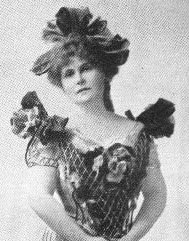Marie Corelli
|
|
Marie Corelli (1855 - 1924), novelist.
Born Mary Mackay on May 1, 1855 in London, she was the illegitimate daughter of a well known Scottish poet and songwriter, Dr. Charles Mackay, and his servant, Elizabeth Mills. In 1866, the very young Mary Mackay was sent to a Parisian convent to further her education. She would only return to England four years later in 1870.
 |
- Marie Corelli - |
Mary Mackay began her career as a musician, adopting the name Marie Corelli for her billing. She gave up music, turning to writing instead and in 1886 published her first novel, A Romance of Two Worlds. In her time, she was the most widely read author of fiction but came under harsh criticsm from many of the literary elite for her overly melodramatic and emotional writing. Despite this, her works were collected by members of England's Royal family, and by Winston and Randolph Churchill, amongst others.
Professional critics deplored her books. The Jacqueline Susann of her time, a feminine and non-confrontational "lipstick lesbian," who had a long cozy relationship, her difficult ego and huge sales inspired some quotable moments of spite: Grant Allen called her, in the pages of The Spectator, "a woman of deplorable talent who imagined that she was a genius, and was accepted as a genius by a public to whose commonplace sentimentalities and prejudices she gave a glamorous setting;" James Agate represented her as combining "the imagination of a Poe with the style of a Ouida and the mentality of a nursemaid."
Corelli spent her final years in Stratford-upon-Avon. There, she fought hard for the preservation of Stratford's seventeenth century buildings, and donated money to help their owners remove the plaster or brickwork that often covered their original timber framed facades. Her eccentricity became legendary, however, and she caused much amusement by boating on the Avon in a gondola, complete with gondolier, that she had brought over from Venice. She died on April 21, 1924, in Stratford and is buried there in the Evesham Road cemetery. Her house, Mason Croft, still stands on Church Street and is now the home of the Shakespeare Institute.
Her fantastic works were so popular in their day, yet now so forgotten, that it moves one to reflect upon the British best-selling authors of a hundred years later.
A poem by Billy Bennett, entitled The Postman [1] (http://www.monologues.co.uk/The_Postman.htm), makes reference to Corelli.
Some of Marie Corelli's works:
- A Romance of Two Worlds - (1886)
- Vendetta! - (1886)
- Thelma - (1887)
- Ardath - (1889)
- Wormwood - (1890)
- Barabbas - (1893)
- The Sorrows of Satan - (1895)
- Cameos - (1896)
- The Mighty Atom - (1896)
- The Murder of Delicia - (1896)
- Ziska - (1896)
- Boy - (1900)
- Jane - (1900)
- The Master Christian - (1900)
- Temporal Power: a Study in Supremacy - (1902)
- God's Good Man - (1904)
- Free Opinions Freely Expressed - (1905)
- Holy Orders - (1908)
- Life Everlasting - (1911)
- The Innocent - (1914)
- The Young Diana - (1918)
- The Secret Power - (1921)
- Love and the Philosopher - (1923)
External links
- Jessica Amanda Salmonson, "Marie Corelli & her Occult Tales," 1998 (http://www.violetbooks.com/corelli.html)
- Private Collection, "A rare collection of signed books, letters and personal items from Marie, also complete Bibliography." 2004 (http://www.mariecorelli.org/default.asp)
- Template:Gutenberg authornn:Marie Corelli
